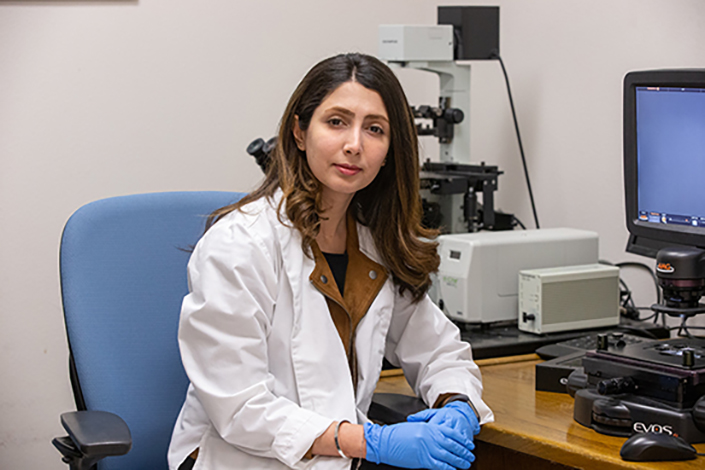Team finds therapeutic approach to treating rare genetic disorder

Mahsa Zarei, a clinical assistant professor at the Texas A&M College of Veterinary Medicine & Biomedical Sciences, has identified a new therapeutic approach to treating tuberous sclerosis complex (TSC), a rare multi-systemic genetic disease that can cause tumors and cancers.
A complex genetic disorder, TSC is characterized by tumor growth in the brain, heart, kidney, skin, and lungs. Affected individuals may also present with seizures. The disorder is caused by a mutation in either the TSC1 or TSC2 protein, resulting in loss of function of the protein.
In a new study published in the Journal of Experimental Medicine, Zarei and her team of researchers expand on previous research investigating the efficacy of THZ1, a cancer drug, in shrinking TSC related tumors by investigating how it works at a molecular level.
Prior to Zarei’s discovery, TSC-related tumors were treated with rapamycin, which is in a class of drugs called Rapologs, which are effective in shrinking TSC-related tumors; however, if the patient stopped taking the drug, their tumors grew back.
“They are good drugs; the only problem with this treatment is that the patient has to be on this treatment forever, so lifelong therapy is necessary to prevent reoccurrence of symptoms,” Zarei said. “We were interested in finding therapies for TSC patients that induce a selective cytocidal response in TSC-deficient cells and kill the tumor, so it doesn’t regrow.”
Zarei and her team began their research by treating TSC-deficient patient’s samples with THZ1, which inhibits CDK7, a cell division protein involved in a pathway that encourages tumor growth. This drug has previously been used to treat different types of cancers, such as triple negative breast cancer, ovarian cancer, and glioblastoma.
Using CRISPR gene-editing and RNA sequence analysis, Zarei and her team were able to determine that this drug affects the way the diseased cell expresses its genes. This change in expression is beneficial, as it discourages expression of genes that support tumor growth.
They also found that THZ1 interferes with gene expression only in diseased cells—those deficient in TSC.
Zarei and her group then compared the effect of THZ1 on tumors with rapamycin, the former standard of treatment. Both THZ1 and rapamycin effectively reduced tumor volume.
“When we stopped the treatment and we looked at the tumor growth, with the rapamycin treatment group, you can see after one week that the tumors started growing (back),” Zarei said. “But in the THZ1 treatment group, there was a marked reduction in tumor volume, and the tumors didn’t grow back.”

